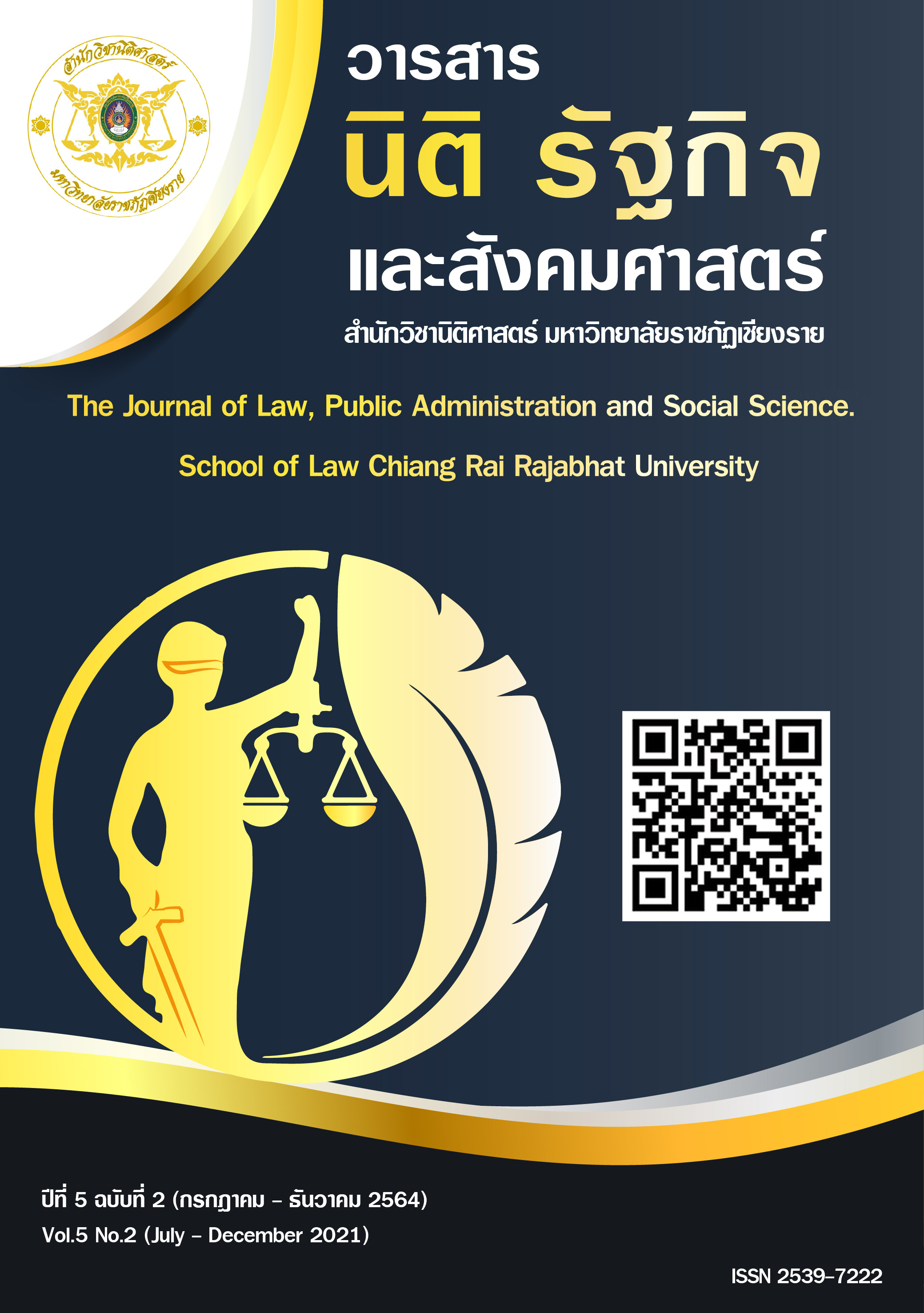การวิเคราะห์เส้นทางความสัมพันธ์เชิงสาเหตุที่มีอิทธิพลต่อความผูกพันต่อองค์การของบุคลากร กรมชลประทาน ส่วนกลาง
Main Article Content
บทคัดย่อ
การศึกษาครั้งนี้มีวัตถุประสงค์ 1) เพื่อการวิเคราะห์เส้นทางความสัมพันธ์เชิงสาเหตุที่มีอิทธิพลต่อความผูกพันต่อองค์การของบุคลากร กรมชลประทาน ส่วนกลาง 2) เพื่อตรวจสอบ สมมติฐานความสัมพันธ์เชิงสาเหตุปัจจัยที่ส่งผลต่อความผูกพันต่อองค์การของบุคลากร กรมชลประทาน ส่วนกลาง กลุ่มตัวอย่างเป็นกลุ่มตัวอย่าง คือ บุคลากรกรมชลประทานส่วนกลาง จำนวน 360 คน โดยผู้วิจัยได้ตัวแปรเชิงสาเหตุที่มีอิทธิพลต่อความผูกพันต่อองค์การของบุคลากร กรมชลประทาน ส่วนกลาง จำนวน 36 ตัวแปร (ข้อคำถาม) ขนาดกลุ่มตัวอย่าง 10 เท่า ของตัวแปร เครื่องมือที่ใช้ในการวิจัย คือ แบบสอบถาม สถิติที่ใช้ในการวิเคราะห์ข้อมูลได้แก่ ความถี่ ร้อยละค่าเฉลี่ย ส่วนเบี่ยงเบนมาตรฐาน และวิเคราะห์เส้นทางอิทธิพล (Path analysis) โดยใช้โปรแกรม AMOS
ผลการวิจัยพบว่า 1) กรอบแนวคิดรูปแบบความสัมพันธ์เชิงสาเหตุปัจจัยที่ส่งผลต่อความผูกพันต่อองค์การของบุคลากร กรมชลประทาน ส่วนกลาง ประกอบด้วยตัวแปรที่มีอิทธิพลทางตรงอย่างเดียวมี 2 ตัวแปร คือ ลักษณะของงานและคุณภาพชีวิตในการทำงานและตัวแปรที่มีอิทธิพลทั้งทางตรงและทางอ้อมต่อความผูกพันต่อองค์การของบุคลากร กรมชลประทาน ส่วนกลาง 7 ตัวแปร คือ สิ่งแวดล้อมที่ปลอดภัยและส่งเสริมสุขภาพ การพัฒนาความสามารถของบุคคล การบูรณาการด้านสังคม ธรรมนูญในองค์การ ความเกี่ยวข้องสัมพันธ์กับสังคม ความมีเอกลักษณ์ของงาน และผลสะท้อนจากงาน 2) รูปแบบเชิงสมมติฐานมีความสอดคล้องกับข้อมูลเชิงประจักษ์พิจารณาจากค่า CMIN/df เท่ากับ .836 ค่า p-value เท่ากับ .505 GFI เท่ากับ .944 AGFI เท่ากับ .934 RMR เท่ากับ .001 RMSEA เท่ากับ .003 NFI เท่ากับ .969 TLI เท่ากับ .926 และ CFI เท่ากับ .959 อิทธิพลรวมของตัวแปรสาเหตุที่ส่งผลต่อความผูกพันต่อองค์การของบุคลากร กรมชลประทาน ส่วนกลางมากที่สุด คือ ลักษณะของงาน รองลงมาคุณภาพชีวิตในการทำงาน องค์ประกอบทั้งหมดอธิบายความแปรปรวนของความผูกพันต่อองค์การของบุคลากร กรมชลประทาน ส่วนกลาง ได้ร้อยละ 88.30
Article Details
เอกสารอ้างอิง
กนกพร แจ่มสมบูรณ์. “ความสัมพันธ์ระหว่างการรับรู้ต่อค่าของงานรูปแบบการบริหารกับคุณภาพชีวิตการทำงานของพยาบาล.” วิทยานิพนธ์พยาบาลศาสตรมหาบัณฑิต บัณฑิตวิทยาลัย มหาวิทยาลัยมหิดล, 2556.
กรมชลประทาน. กรอบอัตรากำลังบุคลากรกรมชลประทาน 22102562. กรมชลประทาน, 2562.
ธานินทร์ ศิลป์จารุ. การวิจัยและวิเคราะห์ข้อมูลทางสถิติด้วย SPSS และ AMOS. พิมพ์ครั้งที่ 13. กรุงเทพฯ: บิสซิเนสอาร์แอนด์ดี, 2555.
นภวรรณ พลพินิจ. “คุณภาพชีวิตในการทำงานกับความผูกพันต่อองค์การของลูกจ้างประจำโรงพยาบาลตำรวจ.” วารสารพยาบาลตำรวจ 5 (2), (ก.ค.-ธ.ค 2556).
พิชิต เทพวรรณ์. การจัดการทรัพยากรมนุษย์เชิงกลยุทธ์: แนวคิดและกลยุทธ์เพื่อความ ได้เปรียบทางการแข่งขัน. กรุงเทพ: ซีเอ็ดยูคชั่น, 2556.
ศุภมิตร บัวเสนาะ. “ปัจจัยส่วนบุคคล ปัจจัยด้านลักษณะงาน และปัจจัยด้าน ประสบการณ์ในการทำงานที่ส่งผลต่อความผูกพันต่อองค์การ: กรณีศึกษาบริษัท ซิว-เนชั่นแนล จำกัด.” วิทยานิพนธ์ศิลปศาสตรมหาบัณฑิต. มหาวิทยาลัยธรรมศาสตร์, 2558.
Agyris, C., & Schon, D. Organization Learning: A Theory of Action Perspective. Boston: Addison-Wesley, 1978.
Allen, N.J. and Meyer, J.P. “The measure and Antecedents of Affective Continuance and Normative Commitment to the OrganizationalCommitment.” Journal of Occupal Psychlogy 63 (1990): 1-18.
Argyris, Chris. Personnel and Organization. New York: Harper & Row Publishers, 1987.
Baron, R. A. Behavior in Organization. Boston: Allyn and Bacon, 1986.
Buchanan, B. “Building organization commitment: The socialization of manager in Work organization.” Administrative Science Quarterly 19(40) (1974): 533-546.
Cronbach, L. J. Essentials of psychological testing. 5th ed., New York: Harper Collins Publishers, 1990.
Field, A., Miles, J., & Field, Z. Discovering statistics using R. Los Angeles: Sage, 2012.
Forehand, G. A., & Gilmer, B. V. H. “Environmental in studies of organization behavior. Psychological Bulletin, 1964.
Litwin, G.H., & Stringer, R. A. Motivation and organization climate. Boston: Division of Research, 1986.
Michaels, Ed; Handfield-Jones, Helen and Axelrod, Beth. The War for Talent. Boston, Massachusetts: Harvard Business School Press, 2001.
Mowday, R.T. Employee Turnover and Postdecision Accommodation Processes. Research in Organizational Behavior. 3, Cummings, L.L and Staw, B.M. eds., 1981.
Robbins, S. P. Organizational Behavior. Englewood Cliffs, NJ: Prentice Hall, 1993.
Steers, R. M. & Porter, L. W. Motivation and Work Behavior. 3rd ed. New York: McGraw – Hill, 1983.
Walton, Richard E. “Improving Quality of Work Life.” Harvard Business Review15 (5), (1974): 12-16.


